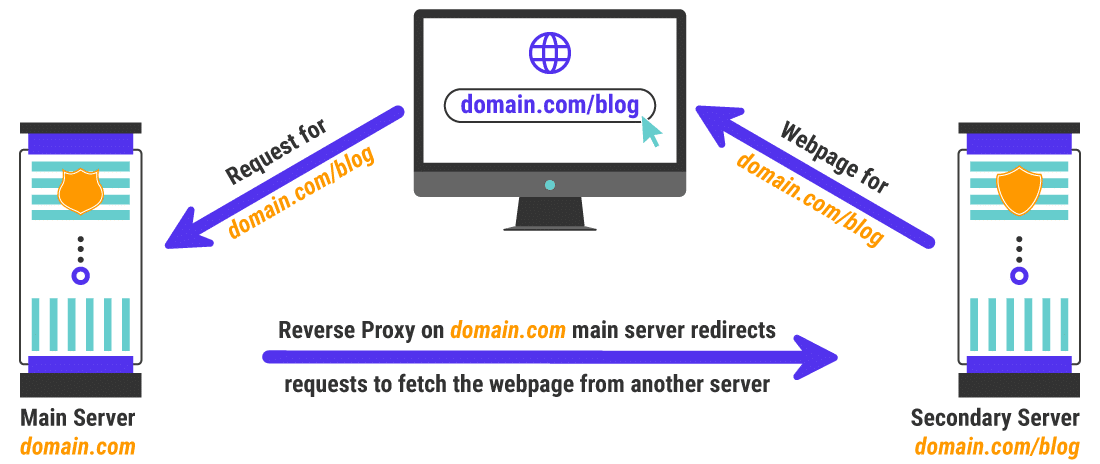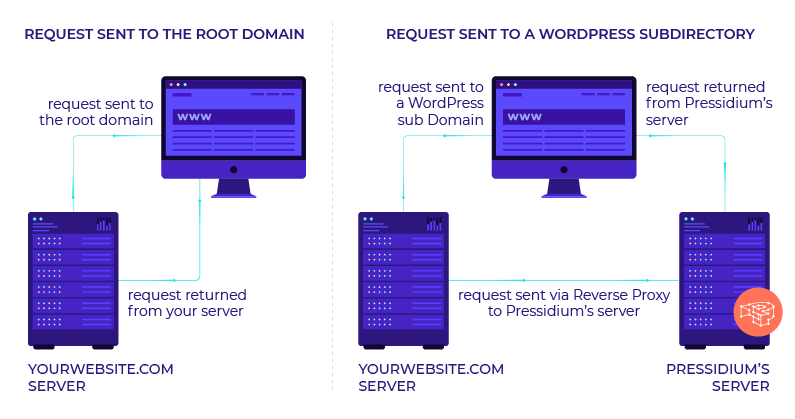Moz Q&A is closed.
After more than 13 years, and tens of thousands of questions, Moz Q&A closed on 12th December 2024. Whilst we’re not completely removing the content - many posts will still be possible to view - we have locked both new posts and new replies. More details here.
WordPress Sub-directory for SEO
-
Hi There,
I'm working on a WordPress site that includes a premium content blog with approx 900 posts.
As part of the project, those 900 posts and other membership functionality will be moved from the main site to another site built specifically for content/membership.
Ideally, we want the existing posts to remain on the root domain to avoid a loss in link juice/domain authority.
We initially began setting up a WordPress Multisite using the sub-directory option. This allows for the main site to be at www.website.com and the secondary site to be at www.website.com/secondary.
Unfortunately, the themes and plugins we need for the platform do not play nicely with WordPress Multisite, so we started seeking a new solution, and, discovered that a second instance of WordPress can be installed in a subdirectory on the server. This would give us the same subdirectory structure while bypassing WordPress Multisite and instead, having two separate single-site installs.
Do you foresee any issues with this WordPress subdirectory install? Does Google care/know these are two separate WordPress installs and do we risk losing any link juice/domain authority?
-
@himalayaninstitute said in WordPress Sub-directory for SEO:
WordPress can be installed in a subdirectory
I have done this a lot and I mean a lot what you want to do is set up a reverse proxy on your subdomain and this will allow you to not only bypass having to use multisite for subfolder but if you want to power it separately you can you do not have to it all. You should probably use your same server and power through Fastly our CloudFlare


once you set this up it is super easy to keep it running in your entire site will be much faster as a result as well
my response to someone else that needed a subfolder
https://moz.com/community/q/topic/69528/using-a-reverse-proxy-and-301-redirect-to-appear-sub-domain-as-sub-directory-what-are-the-seo-risksplease also look at it explained by these hosting companies is unbelievable easy to implement compared to how it looks and you can do so with Fastly or cloudflare in a matter of minutes
-
https://servebolt.com/help/article/cloudflare-workers-reverse-proxy/
-
https://support.pagely.com/hc/en-us/articles/213148558-Reverse-Proxy-Setup
-
https://wpengine.com/support/using-a-reverse-proxy-with-wp-engine/
-
https://thoughtbot.com/blog/host-your-blog-under-blog-on-your-www-domain
-
https://crate.io/blog/fastly_traffic_spike
*https://support.fastly.com/hc/en-us/community/posts/4407427792397-Set-a-request-condition-to-redirect-URL -
https://coda.io/@matt-varughese/guide-how-to-reverse-proxy-with-cloudflare-workers
-
https://www.cloudflare.com/learning/cdn/glossary/reverse-proxy/
-
https://gist.github.com/LimeCuda/18b88f7ad9cdf1dccb01b4a6bbe398a6
I hope this was of help
tom
-
-
@nmiletic The content section of the site requires a unique UI Design and other robust functionality, so having a separate theme/plugins in its own directory is going to be the way we go here. Thanks for your assistance!
-
@himalayaninstitute Have you thought about adding a page and making all of this new content a subpage? Or changing your permalink structure to include a category in the URL? You can then add all of these posts under that category and have the URL show up as www.example.com/category/page-or-post-name
-
The website at the subdirectory will be an online learning platform with a blog, online courses, memberships, gated content, etc. The content currently lives on the main site, so, it's great that we can move it into the subdirectory without taking a hit from Google.
Since these are fundamentally two separate websites, we're not concerned about needing to manage them independently.
Thanks again for your input and advice, we greatly appreciate it!
-
@amitydigital said in WordPress Sub-directory for SEO:
Google will view it as one site so you shouldn't have any issues from that perspective. The Google bot is just looking at pages and won't know/care that the underlying CMS that is running some pages is a different install than other pages. The downside is you now have two websites to maintain, two themes, two sets of files, etc... That may result in a bit of a headache in the future.
As @amitydigital put it, the issue with your approach would be repetitive tasks. You will not loose any DA nor PA (being that you implement a correct 301 redirection). What is going to be on the subdirectory?
-
Google will view it as one site so you shouldn't have any issues from that perspective. The Google bot is just looking at pages and won't know/care that the underlying CMS that is running some pages is a different install than other pages. The downside is you now have two websites to maintain, two themes, two sets of files, etc... That may result in a bit of a headache in the future.
Got a burning SEO question?
Subscribe to Moz Pro to gain full access to Q&A, answer questions, and ask your own.
Browse Questions
Explore more categories
-
Moz Tools
Chat with the community about the Moz tools.
-
SEO Tactics
Discuss the SEO process with fellow marketers
-
Community
Discuss industry events, jobs, and news!
-
Digital Marketing
Chat about tactics outside of SEO
-
Research & Trends
Dive into research and trends in the search industry.
-
Support
Connect on product support and feature requests.
Related Questions
-
Unsolved Google URL inspection live test rendering issue.
Hi Everyone, This is my first post on Moz. I have been trying to get this thing sorted and have read everywhere and everyone just says don't worry about it. I would really like some advice/suggestions on this it will be really helpful. When I use the Google URL inspection tool from the Google search console the page rendering is completely broken. The tool refuses to load resources each time. At end of the day that's how the website is rendered in Google cache. I have already tried disabling cache plugins and Cloudflare but nothing works. site - nationalcarparts.co.nz
Support | | caitlinrolex789
This is how it renders when using URL inspection tool -
https://prnt.sc/7XKHtEU01gEl and if you check cache:https://nationalcarparts.co.nz this is how Google is caching it. Plugins I am using - Elementor Version 3.6.1, Elementor Pro Version 3.6.4, Exclusive Addons Elementor Version 2.5.4, Exclusive Addons Elementor Pro Version 1.4.6, WP- rocket, Cloudflare Pro plan with the plugin. Please if someone has fixed this issue and has a possible solution for it. Thanks cacheissue1.PNG1 -
Wordpress Comments Pagination
Hi Mozzers What is your view on the following. Should you Paginate comments to increase page speed? If yes, at what # of comments would you begin pagination? (with the objective being decreasing page load times) Apply rel="canonical" back to the main article URL? eg: url/comment-page-1 => url noindex the comment pages? create a "View all" comments page? Thanks in advance for your help! 🙂
Intermediate & Advanced SEO | | jeremycabral
J0 -
Does Google hate wordpress?
I have my categories pages set to noindex, follow. I deactivated the author and date based archives, and all the /page/2 /page/3 are noindex. Is this the right approach? I had thought about adding some text to the topic of each category page and then changing them to index. I'm using showing recent post excerpts on the homepage. Another other suggestions? I think two of my sites are in panda for no good reason. It seems like non-wordpress blogs in my industry do better than comparable wordpress sites.
Intermediate & Advanced SEO | | KateV0 -
If you have an unlimited SEO budget, what would you do?
Here's a bit of background information: I've achieved the targets and is now being offered what is essentially an unlimited budget. I have a nice list of ideas but thought I would the brilliant people here at the SEOMOZ community what they would do. So as to promote as much response as possible, I'm going to keep my list to myself for now. And by "SEO", I mean I can do things like content strategy, blogging, infographics, etc. Shoot away!
Intermediate & Advanced SEO | | andrep0 -
Are dropdown menus bad for SEO
I have an ecommerce shop here: http://m00.biz/UHuGGC I've added a submenu for each major category and subcategory of items for sale. There are over 60 categories on that submenu. I've heard that loading this (and the number of links) before the content is very bad for SEO. Some will place the menu below the content and use absolute positioning to put the menu where it currently is now. It's a bit ridiculous in doing things backwards and wondering if search engines really don't understand. So the question is twofold: (1) Are the links better in a bottom loading sidemenu where they are now? (2) Given the number of links (about 80 in total with all categories and subcategories), is it bad to have the sidemenu show the subcategories which, in this instance, are somewhat important? Should I just go for the drilldown, e.g. show only categories and then show subcategories after? Truth is that users probably would prefer the dropdown with all the categories and second level subcategories, despite the link number and placement.
Intermediate & Advanced SEO | | attorney1 -
Does capitalization matter for SEO?
Two places capitalization comes into play: (1) on-page use (title, h1, body text, img alt text, etc) (2) external anchor text I didn't think it mattered from Google's point of view for on-page usage (is this correct?) but I notice that OpenSiteExplorer' s 'anchor text distribution' tab shows different counts for the same keyword if it's capitalized in different ways (eg seomoz.org is listed separate from SEOmoz.org). Is that just OSE or does Google treat the keyword/phrase different based on its capitalization, too? And if so, then should I be creating external links to my site with the 'regular' and 'Capitalized' versions of my key phrases?
Intermediate & Advanced SEO | | scanlin1